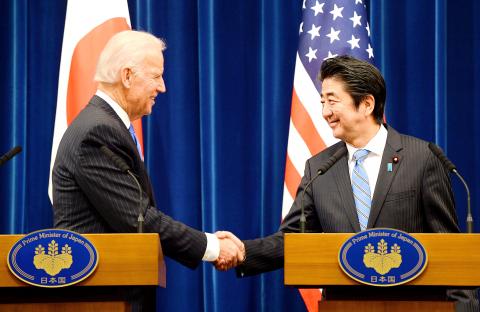|
Biden calls on Japan,
China to lower tensions over zone
Reuters, TOKYO

US Vice President Joe Biden,
left, shakes hands with Japanese Prime Minister Shinzo Abe after their joint
press conference at Abe¡¦s official residence in Tokyo yesterday.
Photo: AFP
US Vice President Joe Biden called on
Japan and China to find ways to reduce tensions that spiked after Beijing
proclaimed an air defense zone over disputed isles in the East China Sea, while
repeating that Washington was ¡§deeply concerned¡¨ by the move.
The US has made clear it will stand by treaty obligations that require it to
defend the Japanese-controlled islands, but it is also reluctant to get dragged
into any clash between the Asian rivals.
¡§This action has raised regional tensions and increased the risk of accidents
and miscalculation,¡¨ Biden told a news conference alongside Japanese Prime
Minister Shinzo Abe.
Biden was on the first leg of an Asian trip that takes him to Beijing today and
then to Seoul.
Japan reiterated on Tuesday that Tokyo and Washington had both rejected
Beijing¡¦s establishment of the zone ¡X despite the fact that three US airlines,
acting on government advice, are notifying China of plans to transit the area.
Washington said over the weekend that the advice to US airlines did not mean US
acceptance of the zone, and last week it sent two B-52 bombers into the area
without informing China.
Washington is also asking China not to set up an air defense zone in the South
China Sea, where Beijing is locked in territorial rows with Southeast Asian
nations, without first consulting countries concerned, a senior official
traveling with Biden told reporters, according to Kyodo news agency.
The Japanese and South Korean governments have advised their airlines not to
submit flight plans in advance as demanded from all aircraft since it announced
the creation of the zone on Nov. 23.
US, Japanese and South Korean military aircraft all breached the zone last week
without informing Beijing and China later scrambled fighters into the area.
Washington takes no position on the sovereignty of the disputed Diaoyutai
Islands (³¨³½¥x), known as the Senkakus in Japan and also claimed by both Taiwan
and China.
However, it recognizes Tokyo¡¦s administrative control and says the US-Japan
security pact applies to them.
|
![]()
![]()
![]()